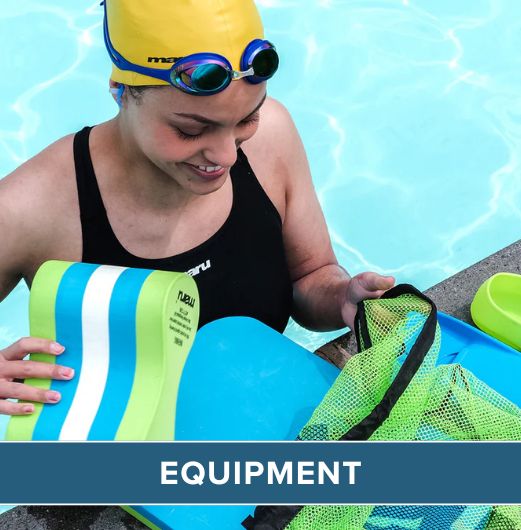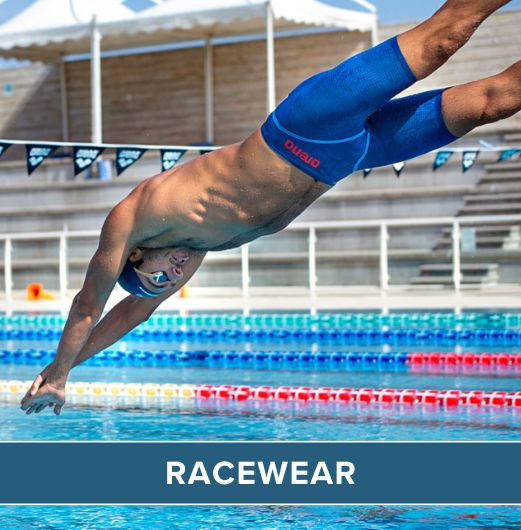
Did you know that swimmer's ear causes more than 2 million trips to hospitals and doctors every single year? This ear infection comes with a whole heap of symptoms and treatments, making it difficult to know what to do if you develop this condition. If you're looking for more information about swimmer's ear, you've come to the right place. Here's everything you wanted to know about this common skin infection that could affect a swimmer just like you.
DISCLAIMER: The information on this page is intended to be a guide to swimmer's ear and does not constitute medical advice. Please see a doctor, who will be able to prescribe you medication, if you have this condition.
What is swimmer's ear?
Otitis externa, also known as swimmer's ear, is an ear canal infection that affects both children and adults. The ear canal is responsible for carrying sound to the eardrum; when the eardrum becomes infected by fungi or bacteria, it could lead to swimmer's ear. One of the most common ways children develop this condition is when they spend time in the water, usually in a swimming pool. Moisture that enters the ear from the environment can infect the skin in the ear, increasing the amount of fungi and bacteria that gets into the ear canal. Other factors can cause swimmer's ear, too. For example, dry skin can increase the chances of someone developing an infection. People who clean their ears with cotton buds or place objects in the ear canal risk developing swimmer's ear. Other ear infections, such as middle ear infection, when pus can drain into the ear canal through a small hole in the eardrum, can also cause the condition to develop.
Swimmer's ear will need to be treated by a medical professional, who will get rid of any pain that is associated with the condition. This pain can range in severity depending on various factors. In some cases, swimmer's ear can have an effect on a person's hearing and may even spread infection. Therefore, it is imperative to seek medical help as soon as you develop this condition. A doctor will usually prescribe you eardrops for the condition, but if your swimmer's ear is serious enough, he or she may recommend other treatments or even refer you to a specialist. There are various homemade remedies that you might want to try to get rid of excess fluid in your ear, too. Some of these might provide you with temporary pain relief.
Swimmer's ear is more commonplace in the summer, which is usually the time of the year when people go swimming.
What causes swimmer's ear?
There are various factors that cause swimmer's ear in children and adults. Some of the most common sources of the infection include moisture from the environment that has become trapped in the ear canal. This moisture can come from spending time in swimming pools. Here's the science behind it: when water becomes trapped in the ear canal, the number of bacteria that reside in the ear increases, which can sometimes lead to an ear infection. This condition might go undetected for a while until symptoms develop.
One of the most common ways that people develop swimmer's ear is when their ear canal makes contact with bacteria that comes from hot tubs or baths. Using a cotton bud or swab to vigorously clean the ear canal can also cause swimmer's ear. Therefore, individuals are advised to seek medical help when trying to remove a build up of wax from the ear canal, rather than trying to get rid of the problem themselves.
Other causes of swimmer's ear include a cut in the skin that surrounds the ear canal. When someone has a cut in the skin, it can increase the chances of bacteria penetrating the ear canal and causing an infection. Swimmer's ear can also occur if someone has a skin condition such as eczema or causes damage to the skin that surrounds the ear canal after trying to remove wax via water irrigation methods. Again, you are advised to see a doctor if you have an excessive build up of wax in your ear.
Another cause of swimmer's ear if placing objects into the ear canal. This might include hearing aids or headphones. It is important, when using this type of equipment, not to push these items too far into your ear canal, somthing that could cause infection or damage.
Finally, swimmer's ear can develop when someone uses chemical-based products like hair dye or hair spray. These chemicals can cause an infection in some cases, especially with prolonged use. You are advised to place cotton wool balls in your ears when using hair dyes or hair sprays to reduce the likelihood of you developing swimmer's ear.
What are the symptoms of swimmer's ear?
A wide range of symptoms are associated with swimmer's ear. This list is not exhaustive and will depend on the individual who has the condition. Remember, if your symptoms cause you pain or discomfort, see a doctor who will be able to provide you with more information.
Some of the most common symptoms include itching and mild pain that emanates from the ear canal. This pain can range in severity depending on various factors. For some people, pain might get worse if someone with swimmer's ear pulls on the outer ear, and he or she might experience discomfort when taking a shower or bath or swimming in a pool. Some people might experience a sensation that feels like their ear is blocked or full. If this is the case, you might want to see a doctor or purchase an over-the-counter product from your pharmacy that can help alleviate this symptom.
Less common symptoms include drainage from the ear. Some people even report feeling unwell when they have swimmer's ear. Another symptom is a decrease in hearing, which is usually instantly noticeable. Swimmer's ear can even cause pain that might start in the ear canal and spread to other parts of the boy, namely the face, neck, or the side of the head. Swollen lymph nodes in the neck and around the ears may also develop, which can lead to a feeling of discomfort. Also, swelling and redness of the skin can also develop in people who suffer from swimmer's ear.
If you experience any of these symptoms, it's important that you seek medical help immediately. If left untreated, these symptoms can worsen over time, causing you more discomfort. For some people who don't take steps to treat the condition, other symptoms may develop. For example, a person might experience hearing loss; however, the person's hearing will usually return to normal after the infection has gone. A person who has swimmer's ear might also develop ear infections on a more regular basis. Without the right treatment, these infections could become dangerous, causing damage to the cartilage and bones, a condition that is known as malignant otitis externa. Although this is rare, people should take both preventative measures and seek medical help to combat swimmer's ear. Serious ear infections, that go untreated, could possibly spread to the cranial nerves, skull, or even the brain, causing a number of other conditions. Medical professionals state that people with diabetes and older adults could be at risk of developing serious complications as a result of an ear infection.
Some people say that their ears itch when they have swimmer's ear but this could be a symptom of another ear-related condition. Your doctor will be able to provide you with more information.
Why you should see a doctor if you have swimmer's ear
Although the above list of symptoms might sound frightening, there are a number of treatments available for swimmer's ear that can get rid of the condition and return your ear canal to its regular state. The first thing is to identify whether you have swimmer's ear or another type of ear infection. You should make an appointment with your GP who will be able to provide you with all the information you need. When you visit your doctor, he or she will inspect your ear canal for symptoms of the condition, which may include swelling and redness of the ear. You might have discharge flowing from your ear canal; they will test this fluid to see if there is any fungus or bacteria in your ear canal.
If you have recurring swimmer's ear or have suffered from an ear condition in the past, you might be referred to a specialist. If this happens, a medical professional will inspect your ear for signs of infection, such as swelling and redness, and decide on the best course of action in your circumstances. Like your GP, a specialist will inspect any fluid or discharge from your ear and check for bacteria and fungus.
It is important to see a doctor as soon as you think you might have swimmer's ear or another ear infection. Identifying the problem early can provide you with a number of benefits; putting off seeing a professional could make the problem worse and lead to more serious infections damaging your ear canal and the skin around it. Remember, you can ask your doctor any questions that you have about your condition. Your doctor will ask you how long you have suffered from the condition and whether you have experienced other ear infections in the past.
Also, seeing a doctor is important if you have any underlying ear conditions that need to be assessed. Many people make the mistake and think that an ear infection is the same as swimmer's ear. This isn't the case. There are various ear infections, which come with a number of different symptoms. Ear conditions can develop quickly and lead to other problems, meaning it's important that you see a doctor who will check out the problem. In some cases, an ear infection could cause problems with your balance and lead to loss of hearing.
What eardrop treatments are there for swimmer's ear?
One you have been to a doctor or specialist, you will usually be prescribed medication for the condition. This might include eardrops that you will need to use at regular intervals during the day until the condition improves. Your doctor or a specialist will tell you how frequently you will need to use your ear drops and for how long. If you are unable to administer the ear drops, you will need to ask a friend or family member to help you. Eardrops are usually prescribed to people who are in the beginning stages of the condition, before swimmer's ear develops into something more serious. Most people find eardrops useful in clearing up their condition in a matter of days. For other people, it might take longer. If you have been prescribed eardrops but find that your swimmer's ear hasn't cleared up after a prolonged period of time or has gotten worse, make another appointment to see your GP.
Your medication will come with an instructional booklet on how to administer your eardrops; alternatively, your doctor or specialist might provide you with a demonstration. Usually, you will need to be lying down on a comfortable surface, usually a bed or sofa, which makes it easier for you to self-administer the ear drops. If you have asked a friend or family member to administer your ear drops for you, he or she might also find it easier to use the product when you are lying down on a flat surface. Eardrops will usually need to be dropped into the ear until the ear is full. Once the medication has been applied, you should remain lying down for around a minute or so for the product to be properly absorbed into your ear canal. The eardrops might feel cold or "ticklish" when you first use them, although this sensation should disappear over time.
Eardrops work by preventing bacteria and fungi from growing further. They also reduce the inflammation that may have built up in your ear canal, something that might be causing you pain or discomfort. This type of medication will usually contain a mild acid that is used for infections. You will be able to find out more about your medication, and the ingredients it contains, by doing a search online. You can also discuss your condition, including symptoms you have and possible treatments, on a healthcare message board.
What other treatments are available for swimmer's ear?
If you have used eardrops for your condition, it should usually do the trick. However, if you have a severe infection or have had an ear infection in the past, your doctor or a specialist might prescribe you antibiotics instead. Like ear drops, this medication works by limiting fungi and bacteria growth in the ear and fighting inflammation. A medical professional will usually administer the antibiotics to the ear, often using a sponge so the antibiotics will enter your ear canal properly. After the procedure, your doctor or specialist might prescribe you pain medication.
Another treatment is topical and oral antibiotics that you will need to use over a prolonged period of time to fight inflammation and infection and resolve your swimmer's ear symptoms. Just like eardrops, your doctor or specialist will tell you how often you will need to use the medication and for how long. You will also receive an instructional booklet with more details about the product. Although ear drops are usually prescribed at the beginning of an ear infection, and doctor-administered antibiotics for more serious conditions, oral medication might be prescribed if your infection extends from your ear canal. In addition, topical medication might be prescribed if your infection solely resides inside your ear canal. This medication could clear your swimmer's ear in a matter of days although this will depend on various factors. You might need to make a follow-up appointment with your doctor or GP if the condition suddenly gets worse or doesn't clear up. A specialist might use special equipment to clean your ear canal and reduce the inflammation that is associated with swimmer's ear.
How can swimmer's ear be prevented?
If you want to avoid getting swimmer's ear in the first place or prevent getting it again in the future, there are a number of precautions you can take, many of which will come as second nature if you practice them regularly enough. These preventative measures are great if you swim on a regular basis and want to stop bacteria from entering your ear canal.
Medical experts suggest that a dry ear is less likely to become infected with bacteria and fungi than a wet ear. Therefore, you will want to keep your ears dry when swimming in a pool or relaxing in a bath. You can use swim ear plugs, which are available at Simply Swim. Many different brands manufacture these swim ear plugs, which will provide support for your ears and reduce your chances of developing an infection after spending time in a swimming pool.
Alternatively, use a towel to dry your ears after swimming or taking a bath. The key is to gently pat your ears with the towel, instead of rubbing them, to prevent damage to your ear canal.
You can also have your ears cleaned on a regular basis. A professional will be able to remove wax safely from your ear, preventing you from using cotton buds and swabs which could cause an infection and lead to swimmer's ear. Look for a reputableprofessional in your area who can do this for you.
Conclusion
Think you have swimmer's ear? Don't worry, this condition's a lot more common than you think, especially during the summer months when people go swimming. It's usually caused by water but there are a number of causes, such as using headphones and hearing aids, or using cotton buds to clean your ear. Thankfully, you'll find there are a number of treatments that will get rid of the condition if you see a doctor, including ear drops and antibiotics. Once it's sorted, you'll be able to take preventative measures to stop it happening again, such as investing in a good pair of ear plugs, patting your ears dry with a towel and seeing a specialist to clean your ears. Soon you'll be back swimming, too!
 Free Tracked UK Delivery
Free Tracked UK Delivery Hassle Free Returns
Hassle Free Returns Next Working Day OPTION
Next Working Day OPTION Found It Cheaper?
Found It Cheaper?













